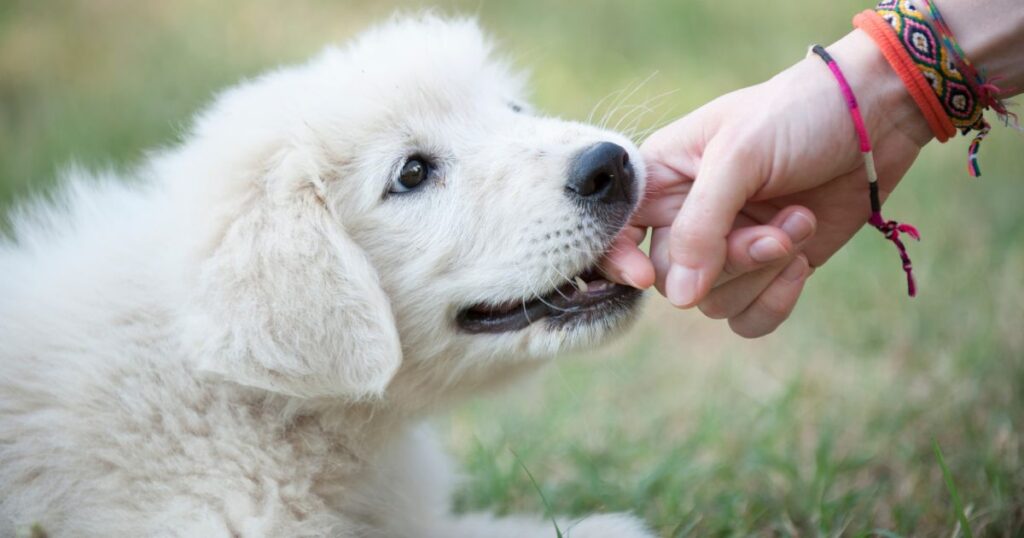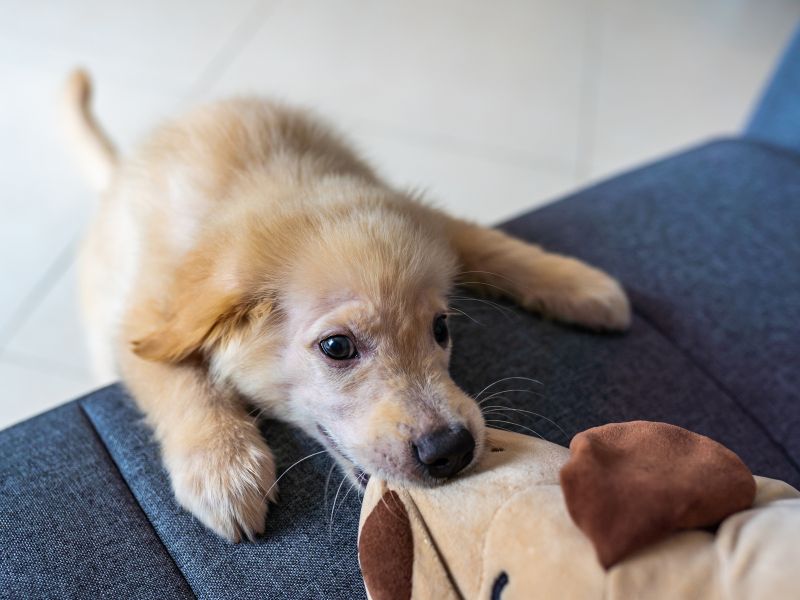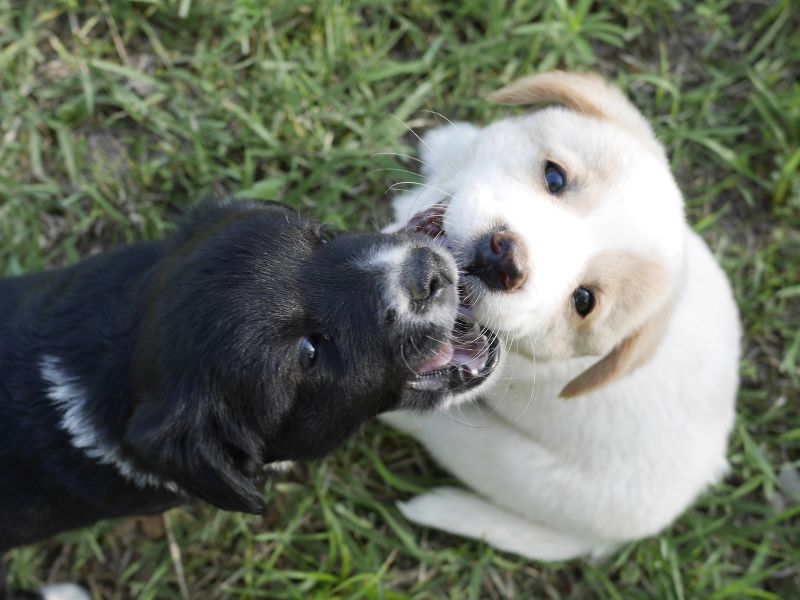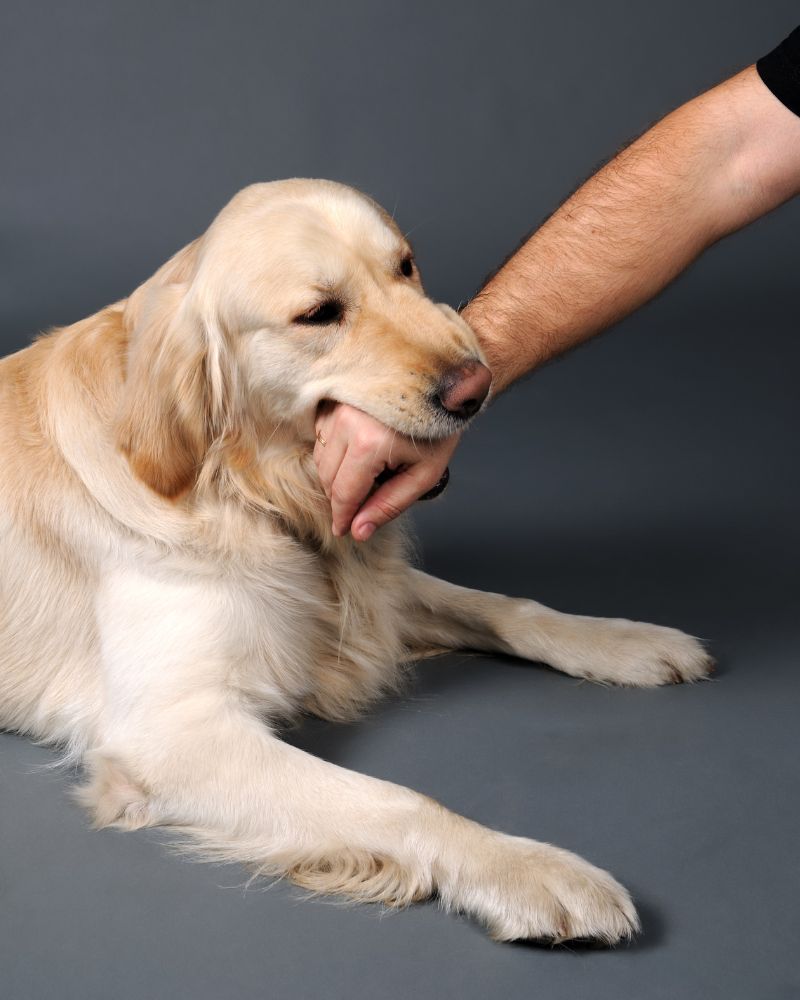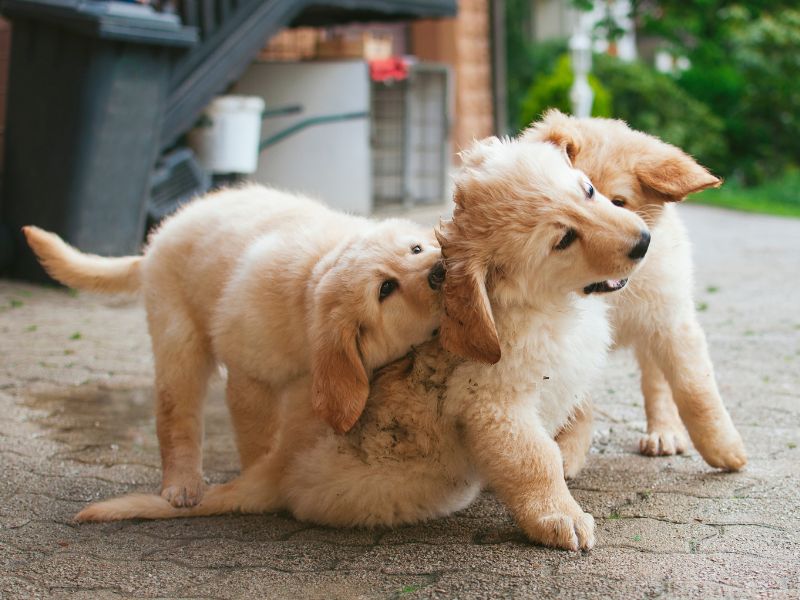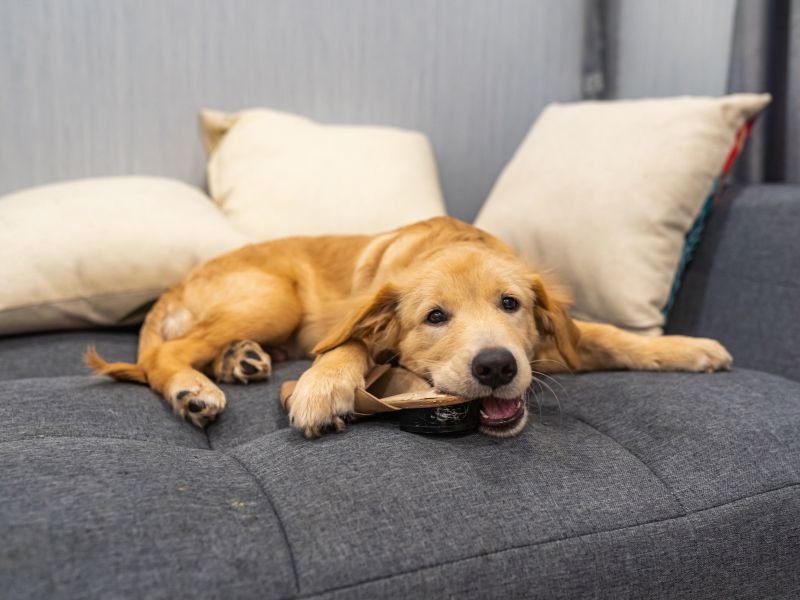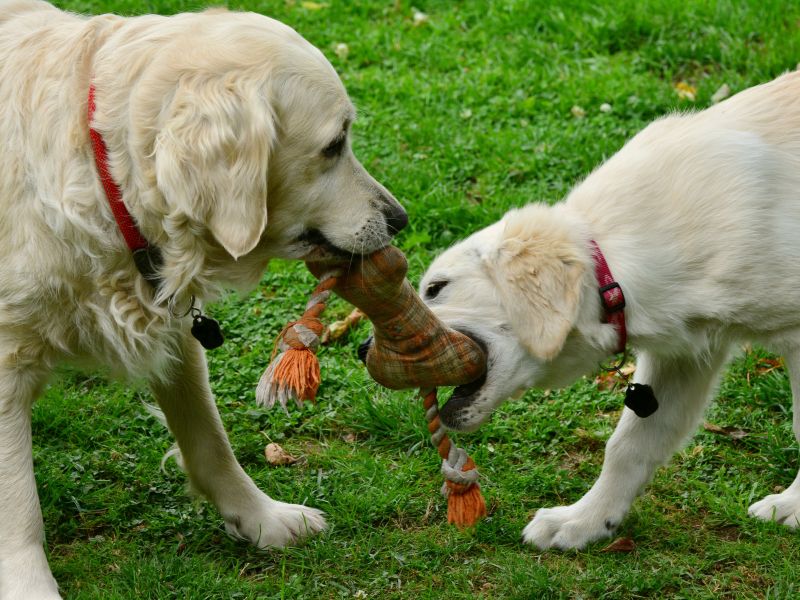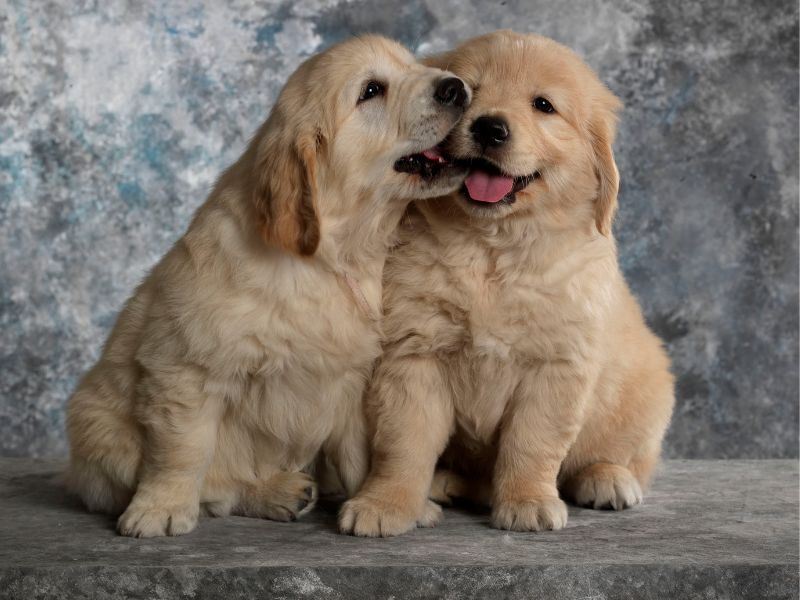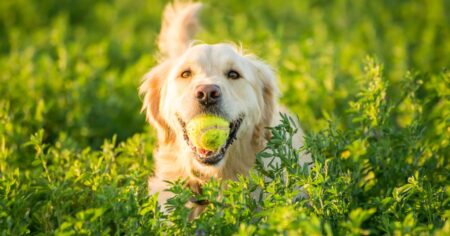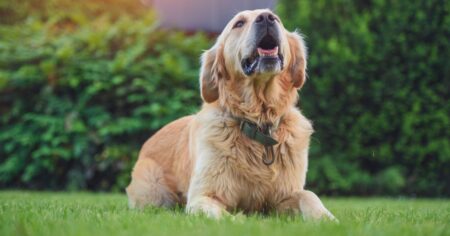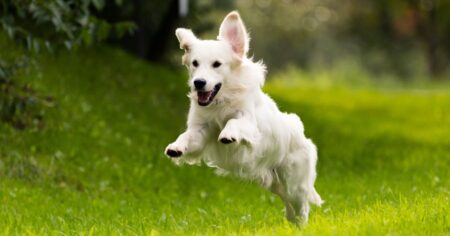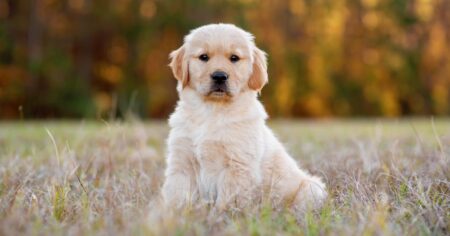Puppy biting is a common behavior among puppies that can be frustrating for new pet owners. Puppies use their mouths to explore the world around them, and biting is a natural part of that exploration. However, it can quickly become a problem if not addressed early on.
Fortunately, there are several effective ways to prevent and stop puppy biting. One method is to teach bite inhibition, which involves teaching the puppy to control the pressure of their bite. Another method is to redirect the puppy’s biting behavior towards appropriate chew toys. Consistency and patience are key when addressing puppy biting, as it may take time for the puppy to learn and adjust their behavior.
Overall, understanding why puppies bite and how to address the behavior is crucial for new pet owners. By implementing effective training techniques and providing appropriate chew toys, puppy biting can be managed and eventually eliminated.
Puppy Biting Explained & Handled [Video]
Puppies are adorable, but their biting can be quite painful. It’s important to understand why puppies bite and how to handle it. In the early ’70s and late ’80s, Stanford and some other universities did extensive studies on puppy behavior. They found that puppies bite for several reasons, including teething, playfulness, and exploration.
Teething is a natural process for puppies, and biting helps relieve the discomfort. However, puppies can also bite out of playfulness. They may nip at your hands or feet as a way to initiate play. Finally, puppies may bite out of exploration, as they use their mouths to examine their surroundings.
It’s essential to handle puppy biting correctly to prevent it from becoming a long-term problem. One effective method is to redirect their biting behavior by providing them with appropriate chew toys. This will help satisfy their urge to chew and reduce their biting of people.
Another technique is to use positive reinforcement to teach puppies that biting is not acceptable. Whenever a puppy is playing appropriately, reward them with praise and treats. Conversely, whenever they bite, redirect their attention to a chew toy and ignore them until they calm down.
To learn more about how to handle puppy biting, check out this informative video here. It provides a comprehensive guide to understanding and managing puppy biting behavior.
Why Do Puppies Bite?
Puppies use their mouth to explore the world, and biting is a natural part of their development. They use their teeth during play and exploration to learn about the world, and it plays an important role in their socialization. Puppies also chew on everything, including you and your clothes, while they are teething.
When puppies and dogs play, they use their mouths to get the other dog’s attention. Some breeds, like herding dogs, are genetically predisposed to chasing and nipping things, like ankles. This behavior is normal, and it is not a sign of aggression.
Puppies may also bite because they are feeling anxious or stressed. This can happen when they are in a new environment or meeting new people. In these situations, biting can be a way for puppies to express their discomfort.
It is important to note that puppies do not bite to be aggressive or to cause harm. They are simply using their natural instincts to explore and learn about the world around them. However, it is important to teach puppies bite inhibition to prevent them from hurting people or other animals unintentionally.
Overall, biting is a normal behavior for puppies, and it is important to understand why they do it. By providing them with appropriate outlets for their biting behavior and teaching them bite inhibition, you can help your puppy develop into a well-behaved adult dog.
Acquired Bite Inhibition (ABI)
Acquired Bite Inhibition (ABI) refers to a dog’s ability to control the force of its bite. This is an important skill for any dog to learn, as it can prevent serious injuries to humans and other animals. ABI is not an instinctual behavior, but rather something that is learned through socialization and training.
Puppies learn ABI through play with their littermates and interactions with their mother. When a puppy bites too hard during play, its littermates will often yelp and stop playing with it. This teaches the puppy that biting too hard is not acceptable behavior. Similarly, if a puppy bites its mother too hard while nursing, the mother will often growl or snap at the puppy, teaching it to be more gentle.
Dog trainers care deeply about a dog’s ABI because it has important prognostic implications. Dogs with poor ABI are more likely to bite humans or other animals, which can lead to serious injuries and legal consequences. Conversely, dogs with good ABI are less likely to bite, and are generally considered to be better socialized and more well-behaved.
Overall, ABI is an important skill for any dog to learn, and dog owners should take steps to ensure that their puppies are socialized and trained properly. This can include enrolling in puppy classes, providing plenty of opportunities for play and socialization, and working with a professional dog trainer if necessary.
How Puppies Learn To Control Their Bite Force
Puppies have a natural tendency to bite and chew on objects, including people. However, it is important for them to learn how to control the force of their bite to prevent injuries to humans and other animals.
As puppies mature, they learn how to moderate the strength of their bite through their social interactions with their mothers and siblings. This process is called bite inhibition, which refers to a dog’s ability to gauge the pressure of their jaws and therefore teaches them how to avoid biting too hard, especially when playing or interacting with humans.
According to Dog Discoveries, puppies learn bite inhibition through a series of steps. When puppies are nursing, they learn to control the force of their bite by biting their mother’s nipples gently. If they bite too hard, the mother will move away, and the puppy will learn to bite more gently.
As puppies grow older, they start to play with their littermates, and this is where they learn the most about bite inhibition. During play, puppies will bite each other, and if one puppy bites too hard, the other will yelp and stop playing. This teaches the puppy that biting too hard is not acceptable and that they need to control their bite force.
It is important for owners to continue this training when they bring their puppies home. If a puppy bites too hard during play, the owner should yelp and stop playing, just like the littermate would. This will teach the puppy that biting too hard is not acceptable, and they will learn to control their bite force.
Overall, bite inhibition is a crucial skill for puppies to learn, and it is important for owners to continue this training to prevent injuries to humans and other animals.
Help, My Puppy Won’t Stop Biting Me!
Puppies are adorable, but their biting can be a real problem. It’s natural for puppies to bite and chew, but it’s important to teach them what is acceptable and what is not. If you’re struggling with a puppy that won’t stop biting, don’t worry – there are things you can do to help.
First, it’s important to understand why your puppy is biting. Puppies often bite because they are teething and need something to chew on. They may also bite because they are playing and don’t realize that their biting hurts. In some cases, puppies may bite because they are feeling anxious or scared.
To help your puppy stop biting, try the following tips:
- Provide appropriate chew toys: Make sure your puppy has plenty of appropriate chew toys to play with. This will help satisfy their need to chew and bite.
- Teach bite inhibition: When your puppy bites too hard, make a yelping sound to let them know that they hurt you. This will teach them to be more gentle when playing.
- Redirect their attention: If your puppy starts biting you, redirect their attention to a toy or treat. This will help them learn what is acceptable to chew on.
- Use positive reinforcement: When your puppy behaves well and doesn’t bite, give them lots of praise and treats. This will help reinforce good behavior.
Remember, it’s important to be patient and consistent when teaching your puppy not to bite. With time and effort, your puppy will learn what is acceptable and what is not. If you’re still struggling, consider working with a professional dog trainer who can help you develop a training plan that works for your puppy.
4 Ways To Stop Puppy Biting
Puppies are adorable, but their biting can be painful and frustrating. Here are four ways to stop puppy biting:
- Teach bite inhibition: Puppies need to learn how to control the force of their bites. When a puppy bites too hard during play, yelp loudly to startle them. Then, ignore them for a few minutes. This teaches them that biting too hard ends the fun. Praise them when they bite gently.
- Provide chew toys: Puppies need to chew to relieve teething pain and boredom. Provide them with safe chew toys, such as rubber bones or Kongs filled with treats. Redirect their biting to the toys and praise them when they chew on them.
- Use taste deterrents: Apply a taste deterrent, such as bitter apple spray, to objects you don’t want your puppy to bite. This teaches them that those objects are not for chewing. Be consistent and reapply the deterrent as needed.
- Train with positive reinforcement: Use positive reinforcement to teach your puppy what behaviors are acceptable. Reward them with treats and praise when they chew on their toys or play gently. Use a verbal cue, such as “gentle,” to reinforce good behavior.
Remember, stopping puppy biting takes time and patience. Consistency is key. With these tips, your puppy will learn to control their biting and become a well-behaved companion.
Puppy Biting Fast Facts
Puppies are adorable, but their biting can be painful and frustrating for their owners. Here are some fast facts about puppy biting:
- It’s a natural behavior: Puppies explore the world with their mouths, and biting is a normal part of their development. However, it’s important to teach them appropriate biting behavior to prevent problems in the future.
- It can be caused by teething: Puppies start losing their baby teeth around 3-4 months old, and their adult teeth start coming in. This can cause discomfort and lead to increased biting behavior.
- It can be a sign of playfulness: Puppies often bite during play as a way to interact with their owners and other dogs. However, it’s important to teach them that biting is not an acceptable way to play.
- It can be a sign of aggression: In some cases, biting can be a sign of aggression or fear. If a puppy is biting aggressively, it’s important to seek professional help to address the issue.
To prevent puppy biting, it’s important to establish clear rules and boundaries for your puppy. This can include redirecting their biting behavior to appropriate toys, rewarding good behavior, and providing plenty of exercise and mental stimulation. With patience and consistency, puppy biting can be managed and prevented.
Puppy Biting Mistakes
Puppy biting is a common behavior among young dogs. However, many new puppy owners make mistakes when trying to stop this behavior. Here are some of the most common puppy biting mistakes:
- Physical punishment: Some people believe that physical punishment is an effective way to stop puppy biting. However, this is not only ineffective but also cruel. Physical punishment can cause fear, anxiety, and aggression in puppies.
- Ignoring the behavior: Ignoring the behavior and hoping it will go away on its own is another common mistake. Puppies need guidance and training to learn what is acceptable behavior and what is not. Ignoring the behavior can lead to more serious problems in the future.
- Inconsistent training: Consistency is key when it comes to puppy training. If different people in the household have different rules or methods for stopping puppy biting, the puppy will become confused and not learn as quickly.
- Using hands as toys: Puppies explore the world with their mouths, and using hands as toys can encourage biting behavior. It’s important to provide appropriate chew toys and redirect the puppy’s attention to them when they start to bite.
- Not enough exercise: Puppies have a lot of energy and need plenty of exercise. If they don’t get enough exercise, they may become bored and start biting out of frustration.
By avoiding these common puppy biting mistakes, owners can effectively train their puppies to stop biting and develop good behavior.
Conclusion
Puppy biting is a natural behavior that puppies exhibit as they explore their environment, play, and teethe. However, it can become a problem if not addressed early on.
There are several effective ways to stop puppy biting, including redirecting their attention to appropriate chew toys, using positive reinforcement to reward good behavior, and teaching bite inhibition. It’s important to remain calm and consistent in your training approach and avoid using physical punishment, as this can lead to fear and aggression in your puppy.
If your puppy’s biting behavior persists or becomes aggressive, it’s important to seek the help of a professional dog trainer or behaviorist. They can assess the situation and develop a personalized training plan to address your puppy’s biting behavior.
Overall, with patience, consistency, and positive reinforcement, you can help your puppy learn to control their biting behavior and become a well-behaved and happy member of your family.

